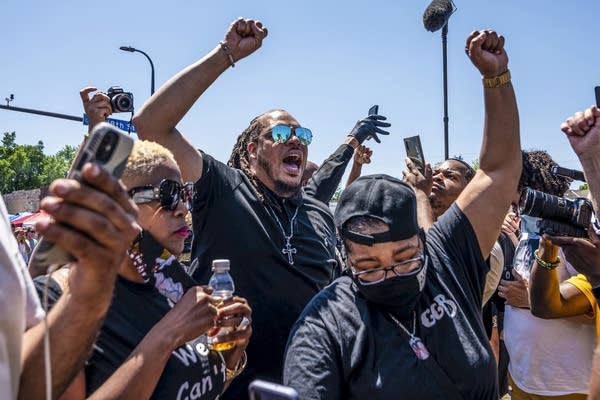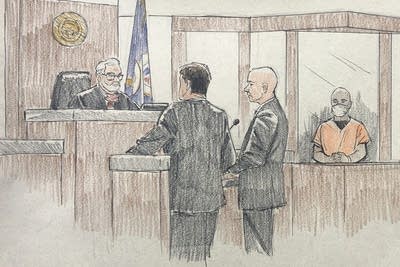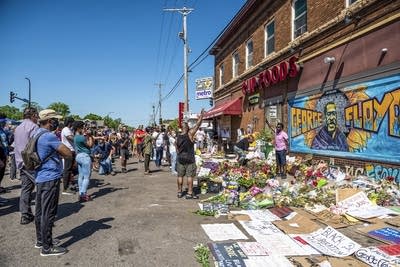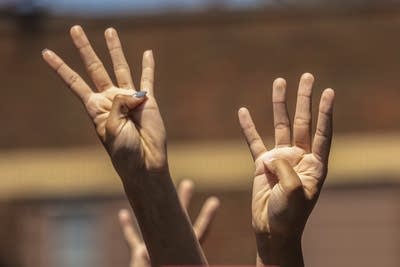Bail set at $1M for 3 cops charged in Floyd’s killing

Go Deeper.
Create an account or log in to save stories.
Like this?
Thanks for liking this story! We have added it to a list of your favorite stories.
Updated 5:34 p.m.
A Hennepin County judge Thursday set bail at $1 million each for Thomas Lane, Tou Thao and J. Alexander Kueng — the three ex-Minneapolis officers charged with aiding and abetting in George Floyd’s killing.
Lane, 37, and Kueng, 26, had only been on the job a few days before confronting Floyd on Memorial Day. Kueng’s training officer, Derek Chauvin, the fourth officer on the scene that night, now charged with second-degree murder, third-degree murder and second-degree manslaughter in Floyd’s killing.

At a bail hearing Thursday afternoon, Earl Gray, Lane’s attorney said Lane asked Chauvin twice If they should turn Floyd over as Floyd pleaded for air. With only four days on the job, Gray said Lane wasn’t in a position to forcefully question Chauvin, an officer with two decades of experience.
Bail was set at $1 million for Kueng, Lane and Thao without conditions and $750,000 with conditions.
Turn Up Your Support
MPR News helps you turn down the noise and build shared understanding. Turn up your support for this public resource and keep trusted journalism accessible to all.
In video from the scene, the three don’t intervene as Chauvin presses his knee against Floyd’s neck while he lays handcuffed on the ground, pleading with officers to let him take a breath.
Chauvin’s first hearing is June 8. The next appearance for Kueng, Lane, and Thao, 34, is June 29.
On Wednesday, Attorney General Keith Ellison, who’s leading the prosecution, cautioned that while his office is “confident” in its ongoing investigation, “history does show there are clear challenges” in convicting police officers for murder.
First-degree murder charges in Minnesota require premeditation, Ellison said Wednesday. Second-degree murder charges involve unintentional killing while committing a felony. Ellison said in this case the felony was an assault on Floyd. “We believe these are the right charges,” he said.

Walz: A chance to break the chain of ‘systemic racism’
Hours after the new charges were announced, Gov. Tim Walz described this moment as a singular opportunity in the state's history to break the chain of “systemic racism and the lack of accountability up and down our society that led to a daytime murder of a black man on a street in Minneapolis.”
The governor challenged Minnesotans to fix the systemic racism that’s at the root of longstanding disparities in education, home ownership, health and other measures that have long plagued Minnesota.
“I think this is probably our last shot as a state and a nation to fix this systemic issue,” he said.
With a legislative special session starting next week, he said there’s a unique opportunity to pass policy changes around such issues as bail reform, or training more teachers of color.
“Our proposals are going to mirror what’s coming out of the community,” he said, saying the Legislature should stay in session for as long as is needed to make real change. “I could see us staying there until we get her done.”
Reflecting on his Wednesday morning visit to Chicago Avenue and 38th Street, near the intersection where Floyd was killed, Walz called it a powerful experience.
“You need to go down there and feel it, so you understand the sense of urgency of the change that has to happen,” he said. “Then it becomes very personal.”
Walz’s remarks came a day after his human rights commissioner, Rebecca Lucero, launched a broad investigation of Minneapolis police that will scrutinize the last decade of the city’s policing — including policies, procedure, training and practices — looking for patterns of discrimination against people of color.
Series of memorials for Floyd
The memorial services to honor George Floyd will be held in three cities over six days, with a chance for mourners to pay their respects in the communities where he was born, grew up, and died — Houston, Raeford, N.C., and Minneapolis.
The Minneapolis memorial took place Thursday afternoon at North Central University in Minneapolis.
Speaking through tears at a news conference Thursday, Roxie Washington, the mother of Floyd’s daughter, called for justice in Floyd’s killing.
“I want everybody to know that this is what those officers took. … I want justice for him. No matter what anyone thinks, he was good. And this is the proof he was a good man,” she said, motioning toward her 6-year-old daughter.
Schools, parks and businesses cut ties with MPD
An increasing number of powerful institutions in Minneapolis are saying they don’t want to be involved with the city’s police officers following Floyd’s killing.
The Minneapolis Board of Education voted Tuesday night to end the public school system’s relationship with the city’s Police Department, ties which have been criticized for years. The district's recent budget put over $1 million toward funding 11 school resource officers.
The move followed a similar one by the University of Minnesota last week.
On Wednesday night, the Minneapolis Park and Recreation Board voted unanimously to cut ties with Minneapolis police. The resolution says that the Minneapolis Police Department will no longer staff park-sanctioned events and that park police will not respond to Minneapolis police’s calls. Park police will also get new uniforms as part of the move.
Separately on Wednesday, the Minneapolis Institute of Art and First Avenue said they would no longer hire off-duty Minneapolis police officers to provide security, which has been a common practice in the city. The Walker Art Center on Thursday announced a similar move to break ties with the Police Department.
More calm in the Twin Cities
Wednesday night marked the fifth evening of calm following the past week’s unrest after Floyd was killed.
While Walz extended his 10 p.m. to 4 a.m. curfew into Friday morning, the number of National Guard troops mobilized decreased. Maj. Gen. Jon Jensen said Wednesday afternoon that the number of troops had gone from around 7,000 to about 5,000.
With the increased peace, Metro Transit resumed its bus and Northstar Commuter Rail services Wednesday and restarted the Blue and Green light rail lines Thursday morning. All had been temporarily suspended amid the metro area’s unrest.








